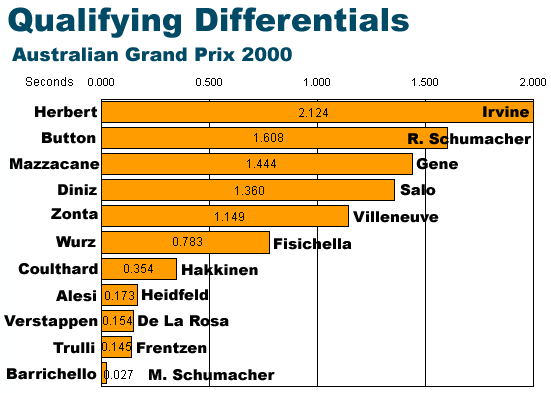|
Atlas F1 is going to keep an eye on the battle between teammates throughout the season with a simple measurement: we compare the qualifying times of each driver against his teammate's result. After every Grand Prix, we will show how teammates have fared up against each other, and where they are overall since the beginning of the season. At the end of the season, the World Champion of Qualifying Differentials will be elected - the driver who was most beaten by his teammates, in seconds. Only those who participate in at least 15 of the 17 rounds are eligible for the coveted crown; and for those who made the efforts and participated in all 17 races, the best and worst result will be scrapped.
With one qualifying session completed for 2000, the differentials are once again on a roll! Let's see which drivers deserve bragging rights.
Australia Notables
- Herbert The Qualifying Differentials runner-up of last year had a weekend from Motorsport Hell in Australia, which saw him outqualified by new teammate Eddie Irvine by over two seconds. This was, in all fairness, through no fault of his own - the Ford-renamed-Cosworth engine constantly betrayed him - and we are positive Johnny will soon enough rectify the charts.
- Heidfeld. while the Formula One pundits were busy fussing around British-boy Button, the true rookie-star was going about his business. Nick did not only qualifying the highest of the newcomers - placing an impossible Prost on the eighth row of the grid, but more importantly - he outqualified his veteran teammate Jean Alesi. Granted, the difference was merely 0.173s between the two but none the less - a remarkable achievement to note.
- Button. And speaking of Button, the youngster also had a terrible Saturday, being forced to run his first ever F1 qualifying in the spare car. If to judge by his solid performance on Sunday, when he was robbed of a championship point by a Bavarian engine breakdown, Jenson's 21st position in qualifying might not be the norm...
The average gap between teammates in Melbourne was rather high - 0.874s. However, it was less than the average in last year's Australian GP, which was 0.922sec.
|

